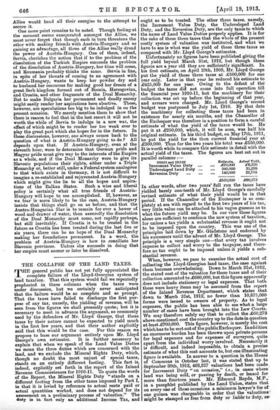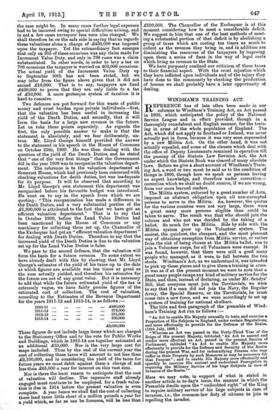THE COLLAPSE OF THE LAND TAXES.
T" general public has not yet fully appreciated the complete failure of the Lloyd-Georgian system of land taxation. That this system would fail we repeatedly prophesied in these columns when the taxes were under discussion, but we certainly never anticipated that the failure would be so complete and so prompt. That the taxes have failed to discharge the first pur- pose of any tax, namely, the yielding of revenue, will be seen from the figures we shall presently quote; but it is necessary to meet in advance the argument, so commonly used by the defenders of Mr. Lloyd George, that these taxes by their nature cannot be expected to yield much in the first few years, and that their author explicitly said that this would be the case. For this reason we propose to base our argument entirely upon Mr. Lloyd George's own estimates. It is further necessary to explain that when we speak of the Land Value Duties we mean the three duties which are concerned with the land, and we exclude the Mineral Rights Duty, which, though no doubt the most unjust of special taxes, stands on an entirely different footing. This fact is, indeed, explicitly set forth in the report of the Inland Revenue Commissioners for 1910-11. To quote the words of the Report, the Mineral Rights Duty "stands on a different footing from the other taxes imposed by Part I, in that it is levied by reference to actual rents paid or actual quantities worked, and does not depend for its assessment on a preliminary process of valuation." The duty is in fact only an additional Income Tax, and ought so to be treated. The other three taxes, namely, the Increment Value Duty, the Undeveloped Land Duty, and the Reversion Duty, are the only taxes to which the name of Land Value Duties properly applies. It is for the sake of these three taxes that the whole of the present costly system of valuation was instituted, and what we have to see is what was the yield of these three taxes as compared with Mr. Lloyd George's estimates.
Unfortunately no figures have been published giving the full yield beyond March 31st, 1912, but though these figures are a year old they are sufficiently significant. In his first estimate, on April 29th, 1909, Mr. Lloyd George put the yield of these three taxes at £500,000 for one year only. Later in that year he reduced his estimate to £425,000 for one year. Owing to the defeat of the budget the taxes did not come into full operation till the financial year 1910-11, but the machinery for their collection was set, up before the beginning of that year, and arrears were charged. Mr. Lloyd George's • second budget was postponed to July 1st, 1910. By that date the machinery for collecting these taxes had been in existence for nearly six months, and the Chancellor of the Exchequer was therefore in a position to form a careful estimate of what the yield of the taxes would be. He put it at £250,000, which, it will be seen, was half his original estimate. In his third budget, on May 17th, 1911, he put the yield for the then current financial year at £300,000. Thus for the two years his total was £550,000. It is worth while to compare this estimate in detail with the actual yield of the taxes. parallel columns :— 1910/11 and 1911/12 The figures are best set out in
Estimate. Aetna/ Yield.
Increment Value Duty ... X70,000 £6,220 Undeveloped Land Duty ... •" 340,000 31,203 Reversion Duty ... • " 140,000 22,755 £550,000 £60,273 In other words, after two years' full run the taxes have yielded barely one-tenth of Mr. Lloyd George's carefully - revised estimate of what their yield would be in that period. If the Chancellor of the Exchequer is so com- pletely at sea with regard to the first two years of his tax, very little value can be attached to his vague guesses as to what the future yield may be. In our view these figures alone are sufficient to condemn the new system of taxation, for unless a tax yields a substantial revenue it ought not to be imposed upon the country. This was one of the principles laid down by Mr. Gladstone and endorsed by his successors until the advent of Mr. Lloyd George. The principle is a very simple one—that every tax involves expense to collect and worry to the taxpayer, and there- fore no tax ought to be imposed unless it yields a sub- stantial revenue.
When, however, we pass to examine the actual cost of collecting the Lloyd-Georgian land taxes, the case against them becomes overwhelming. Down to March 31st, 1912, the stated cost of the valuation for these taxes and of their collection amounted to £680,000, but this figure apparently does not include stationery or legal expenses. That both these were heavy items may be assumed from the report of the Inland Revenue Department, which states that down to March 31st, 1912, no fewer than 10,875,000 forms were issued to owners of property. As to legal expenses, the public has been able to see what a large number of cases have been brought into the Law Courts. We may therefore safely say that to collect the £60,273 above-mentioned cost the country up to the date in question at least £700,000. This figure, however, is merely the cost which has to be met out of the public Exchequer. Inaddition an enormous burden has been thrown upon private persons for legal expenses and for expenses of surveyors, quite apart from the individual worry involved. Necessarily it is difficult, and indeed impossible, to obtain a precise estimate of what this cost amounts to, but one illuminating figure is available. In answer to a question in the House of Commons in October last, it was stated that up to September 30th, 1912, 403,527 valuations had been made for Increment Duty "on occasion," i.e., in cases where land was being sold, or passing by death, or leased for more than fourteen years. Mr. Edmund Royds, M.P.,. in a pamphlet published by the Land Union, states that on every one of these occasions a, minimum lawyer's fee of one guinea was chargeable in order that the valuations might be stamped as free from duty or liable to duty-, as, the case might be. In many cases further legal expenses bad to be incurred owing to special difficulties arising, and in not a few cases surveyors' fees were also charged. We shall therefore be on the safe side in saying that as regards these valuations alone a charge of £430,000 was imposed upon the taxpayer. Yet the extraordinary fact emerges that only on 955 of these occasions was any claim made for Increment Value Duty, and only in 798 cases was a claim substantiated. In other words, in order to levy a tax on 798 occasions the taxpayer is worried on 403,000 occasions. The actual yield of the Increment Value Duty up to September 30th has not been stated, but we may infer from the figure above given that it did not exceed £10,000. That is to say, taxpayers are fined £430,000 to prove that they are only liable to a tax of £10,000. A more grotesque system of taxation it is hard to conceive.
Two defences are put forward for this waste of public money and cruel burden upon private individuals—first, that the valuation has been useful in increasing the yield of the Death Duties, and secondly, that it will form the basis for a large new revenue in the future. Let us take these points separately. As regards the first, the only possible answer to make is that the statement is absolutely, and we fear deliberately, un- true. Mr. Lloyd George himself provided the answer to the statement in his speech in the House of Commons on October 29th, 1909. He was then dealing with the question of the yield of the Death Duties, and he stated that "one of the very first things" that the Government did in the year 1909 was to reorganize the valuation depart- ment. The reference is to the valuation department at Somerset House, which had previously been concerned with checking valuations for death duties, but was inadequate for its purpose. It will be observed that according to Mr. Lloyd George's own statement this department was reorganized before his favourite budget was introduced. He went on to say in the speech from which we are quoting : "This reorganization has made a difference in the Death Duties, and a very substantial portion of the £1,300,000 is attributed to the fact that we have got an efficient valuation department." That is to say that in October 1909, before the Land Value Duties had been sanctioned by the House of Commons or any machinery for collecting them set up, the Chancellor of the Exchequer had got an "efficient valuation department" for dealing with Death Duties. Therefore to say that the increased yield of the Death Duties is due to the valuation set up for the Land Value Duties is false.
We pass to the second defence, that the valuation will form the basis for a future revenue. To some extent we have already dealt with this by showing that Mr. Lloyd George's estimates of the yield of his taxes up to the date at which figures are available was ten times as great as the sum actually yielded, and therefore his estimates for the future are not of any great value. But it is necessary to add that while the future estimated yield of the tax is extremely vague, we have fairly precise figures of the estimated cost of collection. The cost of valuation, according to the Estimates of the Revenue Department for the years 1911-12 and 1913-14, is as follows :— 1910-11 £480,000
1911-12 ... ... 379,000 1912-13 ... 531,000 1913-14 ... ... 630,000 .22,020,000
These figures do not include large items which are charged to the Stationery Office and to the vote for Public Works and Buildings, which in 1913-14 are together estimated at an additional £35,000. Nor is the very large cost for maps included. Thus by the end of the current year the cost of collecting these taxes will amount to not less than £2,100,000, and in considering the yield of the taxes for future years we must debit against them a charge of not less than £65,000 a year for interest on this vast sum.
Nor is there the least reason to anticipate that the cost of valuation will decline. The expensive staff already engaged must continue to be employed, for a fresh valua- tion is due in 1914 before the present valuation is even complete. A year hence we shall find the cost of collecting these land taxes little short of a million pounds a year for a yield which, as far as can be foreseen, will be less than £100,000. The Chancellor of the Exchequer is at this moment considering how to meet a considerable deficit. We suggest to him that one of the best methods of meet- ing a substantial portion of that deficit is by abolishing a group of taxes which are costing ten times as much to collect as the revenue they bring in, and in addition are diminishing the resources of the taxpayers by imposing upon them a series of fines in the way of legal costs which bring no revenue to the State.
We have purposely confined our criticism of these taxes to their financial aspect. With the cruel injustice which they have inflicted upon individuals and of the injury they have done to the community by checking the production of houses we shall probably have a later opportunity of dealing.











































 Previous page
Previous page